My Journey to Columbia as a Woman and a Veteran
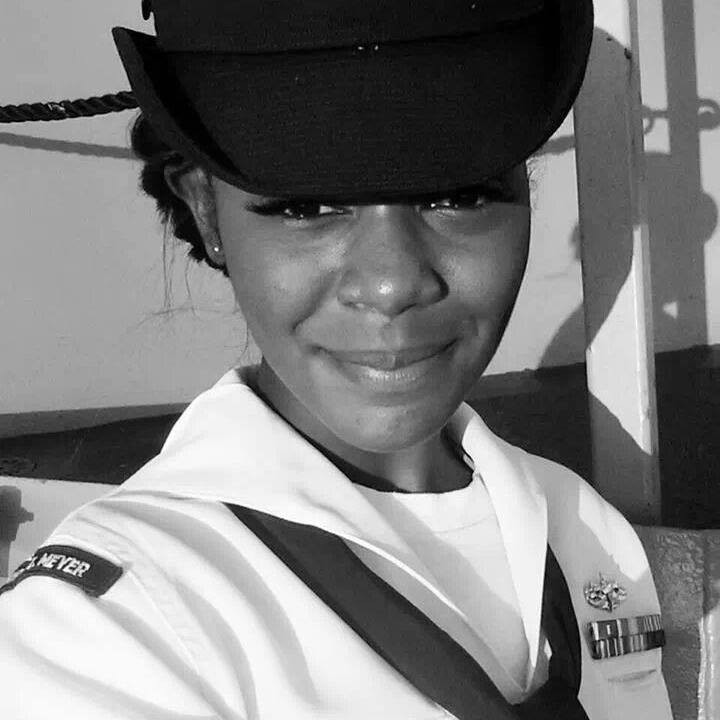
My name is Ebonnie Goodfield and I’m a New York native, born and raised by my teenage mother in Long Island, New York. In spite of challenges and despite all odds, my upbringing consisted of support from my maternal Grandmother and aunts who pushed me to excel academically and follow my dreams.
Upon graduating from Longwood High School in 2009, I was accepted into numerous private institutions to include Dowling College, Elmira College and Hofstra University, but I ultimately made the decision to serve my country. One year later, I enlisted out of Fort Hamilton into the United States Navy and was stationed in San Diego where I served on two WEST-PAC deployments. These tours sailing through the Western Pacific region of the world usually lasted over several months. We had the privilege to see the world and experience new cultures while serving our country and protecting the ones we love, but communication with loved ones was often limited.
My first of these deployments made the largest impact on my life. My first ship, the USS Kidd, underwent a sensitive mission where our pursuit, siege and rescue of Iranian fishermen on a vessel overtaken by Somali pirates resulted in our award of the Global War on Terror Expeditionary Medal. It was on this tour that I also achieved my Enlisted Surface Warfare Specialist qualification and pin, but I felt I lost more than I had gained. In December 2011, my grandmother passed away. Due to the sensitivity of the ship's operation, I had no access to social media or phone calls and was notified of her eventual decline and death through a message sent from the American Red Cross. Additionally, I was not authorized to return home to lay her to rest.
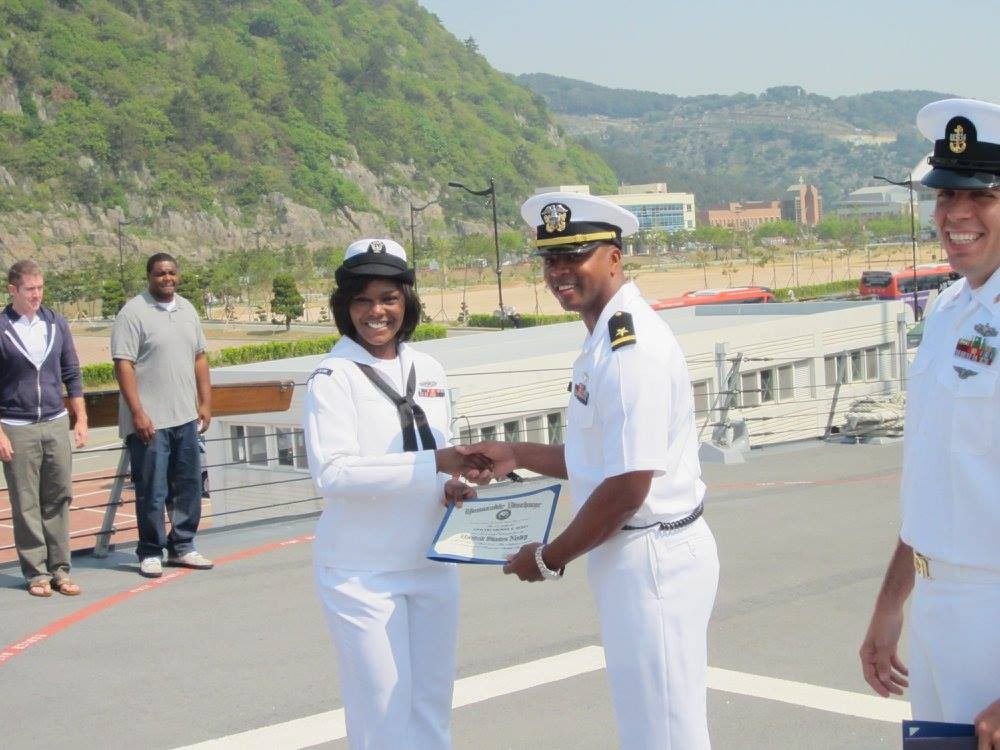
She was the second closest thing I had to a parent and, without the closure of saying goodbye, I didn’t know how to process my grief. I felt the guilt of not communicating with her in her final months or being able to comfort my family after the loss. I grew up quickly on that deployment and learned the lesson that freedom isn’t necessarily free. I had to decide if I could trade the minutes, days or years with my family for yours or anyone else's. It was the comfort and encouragement of my mother and aunts that fueled my perseverance and prompted me to reenlist in 2012.
In addition to my primary duties as a communications technician, I became one of two Master Helmsman aboard my vessel, completed an apprenticeship to receive an Electrician certificate from the United States Department of Labor while being a Secretary of the Morale, Welfare and Recreation for the command and an Assistant Trainer for our “Elite'' physical fitness program. My husband and I were both on active duty when we married in 2014. Before long we were expecting a child, and my contract was coming to an end.
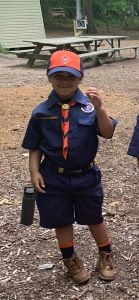
Like many female veterans, I was thrilled to be a wife and a mother. I began my transition out of the military three months after my son was born, and while I love my family more than anything in this world, I loved the Navy too. I had sacrificed precious moments of my family’s lives that I would never get back, so leaving it came with feelings of loss that I had not anticipated. The reality for most veterans after transitioning out of the military is that we lose a huge part of our identity and our support system. For female veterans, this feeling of disconnect can be multifaceted; I was no longer the Service Member, I was the dependent and yet, still not considered relatable by the other dependents because I’m a veteran. Most of my friends were on active duty and stationed elsewhere and my husband’s duty station was 3,000 miles away from our nearest family members. Female service members are a minority within the military, but it was as if female veterans didn’t even exist outside of it. I struggled for years to find a place I belonged.
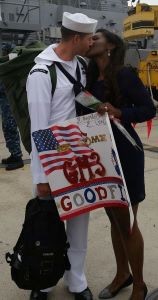
In 2016, the three of us returned to Long Island as my husband was discharged for combat disabilities he accrued. With the loss of income, we struggled to find stable employment and transitional housing in Suffolk County. Many of my husband’s qualifications did not translate to the civilian sector, forcing him into entry level positions and, though I was offered a contracted position for the Federal Aviation Administration, the offer was rescinded due to red tape surrounding my own combat disabilities disqualifying me.
I once again leaned on my mother and sister, who allowed me to stay in my childhood home while seeking resources for homeless veterans. I quickly learned that many of these resources were tailored to men, older veterans or women without spouses or children.
[My] exposure to a network committed to advocating for military veterans and families ignited my passion to spread awareness about unmet needs for women veterans.
We used our savings to secure housing and I was soon recruited to work as the Yellow Ribbon Support Specialist for the 106th Rescue Wing (a New York Air National Guard Base located in Westhampton Beach). Shortly after my hire, I was recognized as a local Hero by the American Red Cross of Long Island. My receipt of the Service to the Armed Forces Award in 2018 was based on my service to my country, and to the local veteran community through my position and membership at VFW Post 5350. This exposure to a network committed to advocating for military veterans and families ignited my passion to spread awareness about unmet needs for women veterans. Living and working in a county with the highest veteran population of the state, I felt an urgency to make a change
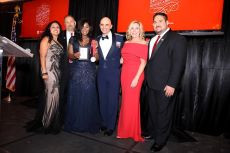
I applied to Columbia University’s School of General Studies one year later. All of my research showed that this undergraduate program held the highest population of veterans of all the Ivy Leagues combined and specifically embraced non-traditional students.
I was admitted to Columbia in Fall 2019, shortly before the COVID-19 pandemic changed everyone’s reality. Before the state shut down in March 2020, I was a commuting student who continued to work full-time and continued my advocacy for women veterans as an Executive Board Member of the Military Veterans of Columbia University, which I still am part of today.
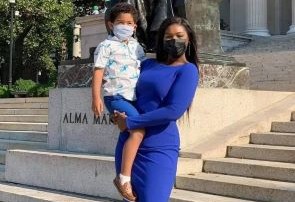
Outside of Columbia’s MilVet organization, female veterans have been my greatest support system at the University. The Women Veteran Roundtables hosted by Dean Rosen-Metsch bring us all together, on equal footing and from different parts of our journeys to simply empower each other. The female administrators of GS who attend sew so much encouragement into us and I feel at home every time I attend.
In our shared experiences and vulnerability, my passion to advocate for women veteran inclusion is reignited in almost every conversation. We are more than non-traditional students; these women are non-traditional veterans. I believe that redefining our idea of who a veteran is; what sex they should be, what ages or what skin color is long overdue. However, fully embracing the female veteran may start on federal and congressional levels, where I hope to challenge society’s pattern of solely eliciting responses to violence against women and the lack of resources or equality in policies or state laws that waiver based on location. Columbia’s rigorous curriculum and open discourse prepares me with the academic foundation to make gender equality in and outside of the military a reality. I feel so validated in my decision to pursue my dreams and tell my story here.

Ebonnie Goodfield is a psychology major at Columbia's School of General Studies and Director of Internal Operations for the Military Veterans of Columbia University organization. As a full-time resource contractor for the New York Air National Guard, she networks and coordinates resiliency events for the deploying Airmen of the 106th Rescue Wing in Westhampton Beach, NY. When she's not studying, working or volunteering, she enjoys spending quality time with her son exploring New York, playing Legos and watching his kid shows without being judged for it.
